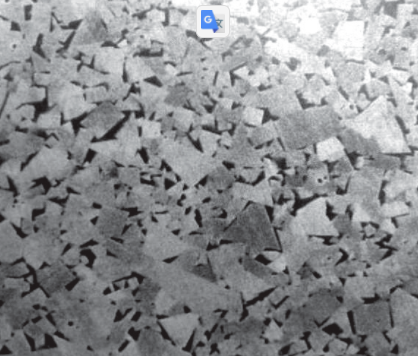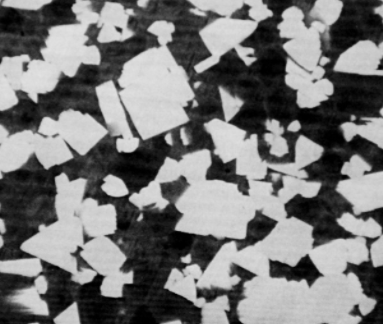The manufacturing process of carbide inserts is shown in Figure 2-8. The basic characteristics of carbide tools are.
(1) High hardness and wear resistance.
(2) High modulus of elasticity.
(3) High compressive strength.
(4) Good chemical stability (resistance to acids, alkalis and high temperature oxidation).
(5) Low impact toughness.
(6) Low coefficient of expansion, thermal and electrical conductivity similar to that of iron and its alloys.
1. Classification and characteristics of common cemented carbides
(1) Tungsten Cobalt (WC+Co) (corresponds to ISO and national standard K class). The higher the cobalt content of the alloy, the better the toughness, suitable for rough machining; the lower the cobalt content, suitable for finishing. The tungsten cobalt carbide is made of WC and Co sintered, the K alloy has good thermal conductivity, which helps to reduce the cutting temperature, the K alloy has good grindability and can be sharpened to a sharp cutting edge, generally suitable for machining cast iron, non-ferrous metals and fibre laminates.

(2) Tungsten, titanium and cobalt (WC+TiC+Co) (corresponding to the national standard P class). These alloys have high hardness and heat resistance, good adhesion and oxidation resistance. They have high plastic deformation, high friction and high cutting temperatures when machining steel, and are slow to wear and have high tool life.
High TiC content in the alloy increases wear resistance and heat resistance, but reduces strength. The tungsten, titanium and cobalt carbide is made from WC as a base, TiC is added and Co is used as a bonding agent to sinter the alloy. However, when the amount of TiC increases, the thermal conductivity of the alloy becomes poor and cracks are easily produced when welding and sharpening.

(3) tungsten, titanium, tantalum (niobium) and cobalt (WC + TiC + TaC (Nb) + Co) (corresponds to the national standard M.) The M alloy adds a suitable amount of rare refractory metal carbides to improve the performance of the alloy. yw alloy is suitable for machining cold hard cast iron, non-ferrous metals and alloy semi-finishing, but also for semi-finishing and finishing of high manganese steel, hardened steel, alloy steel and heat resistant alloy steel. The addition of tantalum (niobium) carbide is another type of carbide generated by adding a small amount of other carbides (such as Ta C or NbC) to the above two hardness alloys, codenamed M, which is suitable for processing both brittle materials and plastic materials. Commonly used grades are M10 and M20.
(4) Titanium carbide (WC + TiC + Ni + Mo) (corresponding to the national standard P01 class). P01 class alloy is titanium carbide based class, it is TiC as the main component, Ni, Mo for the bonding metal. It is suitable for high-speed finishing of alloy steels, hardened steels etc. The main characteristics of TiC-based alloys are very high hardness, good wear resistance and high bonding temperature with steel, which makes the resistance to crescent pits wear strong. It has good wear resistance and oxidation ability, and can still be cut at temperatures between 1000 and 1300°C. The alloy has good chemical stability and low affinity with the material, which reduces friction with the workpiece and is less likely to produce chip tumours. It is suitable for rough machining and low-speed cutting with impact loads, poor resistance to plastic deformation and poor chipping resistance.
2. Characteristics of ultra-fine grain carbide Ultra-fine grain carbide is mostly used in K-type alloys, its hardness and wear resistance has been greatly improved, flexural strength and impact toughness has also been improved, the performance has been close to high-speed steel; suitable for small size milling cutter, drill bits, etc., and can be used for processing high hardness difficult to machine materials.
Cemented carbide is used in large numbers in high-speed cutting tools with good rigidity and simple edge shapes. With the advancement of technology, complex tools are also gradually expanding their application.
Cemented carbide has a high melting point, high hardness carbide content, good thermal fusion, good thermal hardness, high cutting speed but brittle, bending strength and impact toughness is not strong. The flexural strength is only 1/3~1/2 of HSS and the impact toughness is only 1/4~1/35 of HSS, mainly determined by the type and number of carbides, the coarseness of the powder particles and the content of the bonding agent.
Contact: Jacky Wang
Phone: +86 14714816052
Tel: +86 14714816052
Email: jacky@cncnctools.com
Add: Floor 1, Shixi Industrial area, Canton, Guangdong, China. 510288